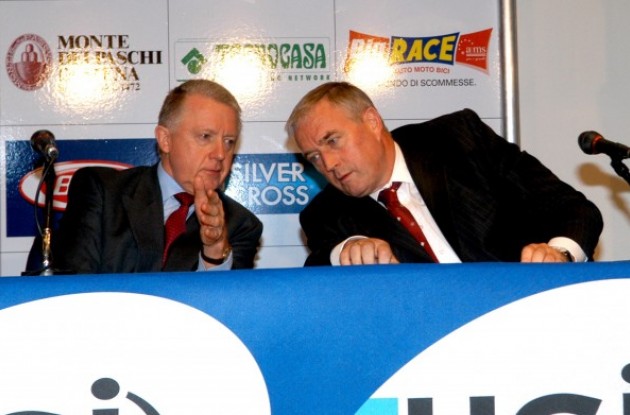UCI Ditches Doping Amnesty Idea and Denies Hiding Positive Samples
At its annual congress, the UCI adopted a motion calling on the governing body to deal with current doping cases and "ignore attempts to exploit commercially or otherwise exploit the painful aspects of cycling's past."
The motion was drawn up earlier this week by the UCI's management committee during discussions about the possibility of setting up a truth and reconciliation commission at which riders could confess their doping pasts as a way of cleaning up the sport and draw a line under an era tainted by drugs.
"That was discussed at management committee and ... from that discussion came this (motion)," UCI president Pat McQuaid said after Friday's congress.
Appearing eager to reduce the major level of attention currently paid to cycling's doping-strained past, the committee said:
"This is the direction we need to go. We need to concentrate on the sport today and not so much on the past," McQuaid explained.
The motion's preamble says there is "no point in continuing to re-examine the past of then undetectable doping and stigmatize the sport of the young generations now that the situation has considerably improved through the UCI's continued efforts."
Asked if the motion meant an end to the idea of setting up a truth and reconciliation commission, McQuaid said "Not necessarily, we'll have to wait and see."
Earlier Friday, McQuaid emphatically denied that the sport's governing body ever covered up a positive doping test by Lance Armstrong or that the organization ever tipped off the seven-time Tour de France winner ahead of a doping test.
McQuaid told delegates at the congress that the organization "has never hidden a positive sample, not just of Lance Armstrong, but of any other athlete."
Disgraced former rider Floyd Landis has claimed that Armstrong tested positive for the blood booster EPO at the Tour of Switzerland in 2001 and paid off then-UCI president Hein Verbruggen to keep it quiet. Verbruggen and Armstrong have denied the allegations.
Tyler Hamilton, a former Armstrong teammate, also has claimed Armstrong had told him that he had tested positive at the 2001 Tour of Switzerland, but that it wouldn't be a problem because "people took care of it."
McQuaid also rejected claims that the organization tipped off Armstrong ahead of time that he was about to be tested.
He said both explosive claims could be included in a file of evidence compiled by the United States Anti-Doping Agency (USADA) that prompted it to ban Armstrong from Olympic sport for life and strip him of his seven Tour de France titles.
The UCI has not yet received a copy of the file. McQuaid said that the UCI "will give the appropriate sanctions" if its lawyers find the report "strong and clean."
Armstrong has long denied doping but chose last month not to fight drug charges by USADA, which wiped out 14 years of his results. USADA finds Armstrong used banned substances as far back as 1996, including EPO, steroids and blood transfusions.








